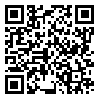Volume 7, Issue 2 (June 2025)
IEEPJ 2025, 7(2): 0-0 |
Back to browse issues page
Download citation:
BibTeX | RIS | EndNote | Medlars | ProCite | Reference Manager | RefWorks
Send citation to:



BibTeX | RIS | EndNote | Medlars | ProCite | Reference Manager | RefWorks
Send citation to:
Shayesteh Mehr S, Taklavi S, Ghaffari O. (2025). Effectiveness of Mixed Reality-Based Exposure and Response Prevention Therapy in Reducing Clinical Symptoms in Individuals with Obsessive-Compulsive Disorder. IEEPJ. 7(2), doi:10.22034/ieepj.2025.7.2.1012
URL: http://ieepj.hormozgan.ac.ir/article-1-996-en.html
URL: http://ieepj.hormozgan.ac.ir/article-1-996-en.html
1- Department of Psychology, Ard.c, Islamic Azad University, Ardabil, Iran
2- Department of Psychology, Ard.c, Islamic Azad University, Ardabil, Iran ,staklavi@iau.ac.ir
3- Department of Psychology, Ard.c, Islamic Azad University, Ardabil, Iran
2- Department of Psychology, Ard.c, Islamic Azad University, Ardabil, Iran ,
3- Department of Psychology, Ard.c, Islamic Azad University, Ardabil, Iran
Abstract: (1491 Views)
Objective: This study investigated the efficacy of mixed reality (MR)-assisted exposure and response prevention (ERP) therapy in alleviating obsessive-compulsive disorder (OCD) symptoms.
Methods: Using a quasi-experimental design, 40 individuals with OCD were selected via convenience sampling and randomly assigned to either an intervention group (n=20) receiving 12 sessions of MR-based ERP therapy or a control group (n=20) with no intervention. Symptom severity was assessed using the Yale-Brown Obsessive-Compulsive Scale (Y-BOCS) at pre-test, post-test, and six-month follow-up.
Results: Repeated measures ANOVA revealed a significant group × time interaction in obsession scores (p < 0.001, η² = 0.395). The intervention group exhibited a substantial reduction in symptoms from pre-test to post-test, with effects persisting at follow-up, while the control group showed no significant change.
Conclusions: Findings suggest that MR-enhanced ERP therapy is an effective and durable intervention for reducing OCD symptoms, supporting its integration into future treatment protocols.
Methods: Using a quasi-experimental design, 40 individuals with OCD were selected via convenience sampling and randomly assigned to either an intervention group (n=20) receiving 12 sessions of MR-based ERP therapy or a control group (n=20) with no intervention. Symptom severity was assessed using the Yale-Brown Obsessive-Compulsive Scale (Y-BOCS) at pre-test, post-test, and six-month follow-up.
Results: Repeated measures ANOVA revealed a significant group × time interaction in obsession scores (p < 0.001, η² = 0.395). The intervention group exhibited a substantial reduction in symptoms from pre-test to post-test, with effects persisting at follow-up, while the control group showed no significant change.
Conclusions: Findings suggest that MR-enhanced ERP therapy is an effective and durable intervention for reducing OCD symptoms, supporting its integration into future treatment protocols.
Type of Study: Original |
Subject:
Educational Psychology
Received: 2024/08/7 | Accepted: 2025/02/11 | Published: 2025/06/1
Received: 2024/08/7 | Accepted: 2025/02/11 | Published: 2025/06/1
Send email to the article author
| Rights and permissions | |
 |
This work is licensed under a Creative Commons Attribution-NonCommercial 4.0 International License. |







